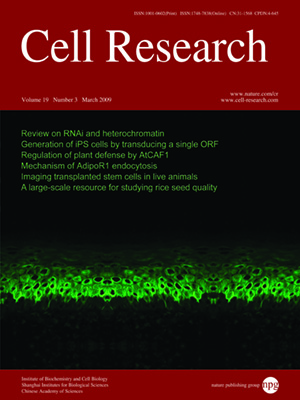
Volume 19, No 3, Mar 2009
ISSN: 1001-0602
EISSN: 1748-7838 2018
impact factor 17.848*
(Clarivate Analytics, 2019)
Volume 19 Issue 3, March 2009: 307-316
ORIGINAL ARTICLES
The Arabidopsis homologs of CCR4-associated factor 1 show mRNA deadenylation activity and play a role in plant defence responses
Wenxing Liang1,2,*, Changbao Li1,3,*, Fang Liu1,2, Hongling Jiang1, Shuyu Li1,2, Jiaqiang Sun1, Xiaoyan Wu1 and Chuanyou Li1
1State Key Laboratory of Plant Genomics, National Centre for Plant Gene Research, Institute of Genetics and Developmental Biology, Chinese Academy of Sciences, Beijing 100101, China
2Graduate School of Chinese Academy of Sciences, Beijing 100039, China
3The State Key Laboratory of Crop Biology, Agronomy College, Shandong Agricultural University, Taian 271018, China
Correspondence: Chuanyou Li,(cyli@genetics.ac.cn)
Messenger RNA (mRNA) turnover in eukaryotic cells begins with shortening of the poly (A) tail at the 3' end, a process called deadenylation. In yeast, the deadenylation reaction is predominantly mediated by CCR4 and CCR4-associated factor 1 (CAF1), two components of the well-characterised protein complex named CCR4-NOT. We report here that AtCAF1a and AtCAF1b, putative Arabidopsis homologs of the yeast CAF1 gene, partially complement the growth defect of the yeast caf1 mutant in the presence of caffeine or at high temperatures. The expression of AtCAF1a and AtCAF1b is induced by multiple stress-related hormones and stimuli. Both AtCAF1a and AtCAF1b show deadenylation activity in vitro and point mutations in the predicted active sites disrupt this activity. T-DNA insertion mutants disrupting the expression of AtCAF1a and/or AtCAF1b are defective in deadenylation of stress-related mRNAs, indicating that the two AtCAF1 proteins are involved in regulated mRNA deadenylation in vivo. Interestingly, the single and double mutants of AtCAF1a and AtCAF1b show reduced expression of pathogenesis-related (PR) genes PR1 and PR2 and are more susceptible to Pseudomonas syringae pv tomato DC3000 (Pst DC3000) infection, whereas transgenic plants over-expressing AtCAF1a show elevated expression of PR1 and PR2 and increased resistance to the same pathogen. Our results suggest roles of the AtCAF1 proteins in regulated mRNA deadenylation and defence responses to pathogen infections.
Cell Research (2009) 19:307-316. doi: 10.1038/cr.2008.317; published online 9 December 2008
FULL TEXT | PDF
Browse 2061


